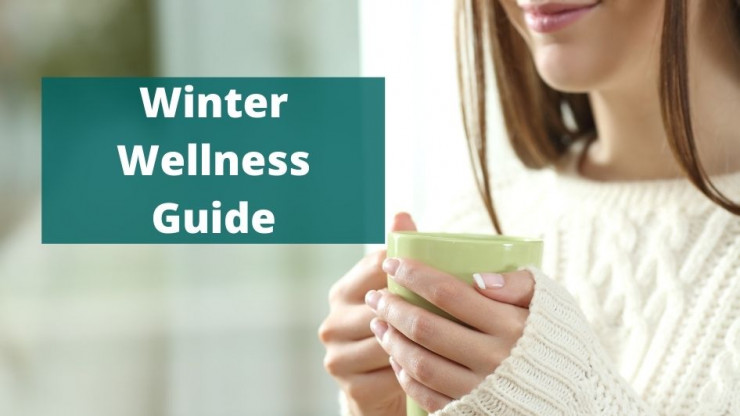With winter upon us now is the time to make sure your immune system is functioning at its best. It can be hard to know where to begin which is why we have put together this winter wellness guide to get you started.
Begin with the basics - Prioritise Sleep
A lot of important functions take place in the body when we get some shut eye and the immune system is no exception. It generates immune cells that act as first responders and help hold the line against any foreign invaders by launching an immediate response. When there are less of these cells due to lack of sleep the body is more susceptible to infection.
But how do we optimise our sleep so that the body is well rested and ready to respond. One of the most important factors is the production of a hormone called melatonin. Melatonin not only helps us to fall asleep but also stay asleep longer. The use of mobile phones and other digital devices before bed can interfere with its production and the time it takes to fall asleep. Avoiding the use of these devices for at least an hour before bedtime can minimise this effect.
However, avoiding all artificial light later in the evening is easier said than done but there are ways to help with the reduction of artificial light: If using your phone or laptop is a necessity in the lead up to bedtime then try installing a blue light filter app. These adapt to the time of day so that after sundown blue light will be filtered out and melatonin production will not be affected. If light from outside is an issue, consider a black-out blind for the window or an eye mask.
If you find yourself wide awake at night, it may also be time to review your caffeine consumption. Caffeine not only keeps us awake but it also reduces the production of melatonin. Be aware that caffeine can take up to 9.5 hours to eliminate from the body, avoid consuming after 2pm.
You should be aiming to get between 7 and 8 hours sleep per night.
A nutrient rich diet
From a dietary standpoint supporting the immune system requires foods that are rich in micronutrients. Vegetables, fruits, berries, nuts, seeds, grains pulses and legumes alongside meats, eggs, dairy products and oily fish are good sources of micronutrients such as vitamin C, selenium and zinc. However, if you are not getting enough of these foods in your daily diet, a supplement may be helpful.
Supplements - Vitamin D
Also known as the sunshine vitamin, vitamin D is a fat-soluble vitamin which is made in our skin upon exposure to the sun’s ultraviolet rays. Many of us know vitamin D is important for healthy bones and teeth because it's required for our bodies to absorb calcium from our diets. However, vitamin D is vital for numerous other functions in the body, notably immunity.
Vitamin D regulates T and B cells supporting the specific, secondary response known as adaptive immunity. The adaptive immune system remembers pathogens it has previously come into contact with and fights them off more effectively the second time around.
It is very difficult to get enough vitamin D from food alone. You would need to consume a portion of salmon or around eight eggs every day! These foods are important to include in the diet but almost certainly will not meet your needs alone.
In the UK the best time to make vitamin D from unprotected sun exposure is in the spring and summer between the hours of 11:00 and 15:00. The sun is strongest at this time, therefore safe and sensible sun exposure is important. As a general rule exposing skin such as the face, arms and legs for at least 10 minutes at least three times a week will help contribute to achieving adequate vitamin D levels.
However, the time required for vitamin D production varies widely depending on skin type and age. Those with pale skin require around 10 minutes exposure on the arms, hands, face and lower legs. Those with very dark skin may need up to 30 minutes as the higher melanin content in the skin works as a natural sunscreen. It’s also important to be aware that various cosmetics and creams contain UV protection that will impact the amount of vitamin D that is made.
Consequently, in the UK approximately 1 in 5 people have low vitamin D levels. Vitamin D deficiency can elicit various symptoms which can include muscle weakness, pain, low energy levels, frequent infections, and bone pain among others. One way to check the extent to which you may need extra vitamin D is through a blood test. There is no agreement on what the optimal level should be but many of the leading vitamin D researchers suggest a level between 75 – 150 nmol/L (30 – 60 ng/mL) is best. Anything below 25 nmol/L (10 ng/mL) is defined as “deficient.”
Even if the sun is shining in autumn and winter, it’s not possible to produce any vitamin D in the body. Consequently, the government recommends that everyone considers taking a supplement during this time. When choosing a supplement look for vitamin D3 (cholecalciferol), this is the active and more bioavailable form of the vitamin.
Support digestive health
Did you know approximately 70% of immune cells are found inside the gastrointestinal tract. Your digestive system houses trillions of bacteria. The foods we choose can have a significant effect on the types of bacteria that dominate this ecosystem. A fibre-rich diet which includes fruits, vegetables and wholegrains along with fermented foods such as kefir and sauerkraut promotes a healthy and diverse population of beneficial bacteria, which in-turn supports a healthy immune system.
Reduce Stress
Chronic stress is associated with suppression of the immune system. We cannot always remove stressors from daily life, but we can change the way we respond to them. Try adding in some techniques to your daily routine such as mindfulness meditation. This has been shown to help reduce stress, stress sensitivity, and improve parameters of immune function.
Embracing exercise
You don’t have to be running marathons to experience the immune benefits that exercise has to offer, it’s all about balance. Exercising regularly with moderate-to-vigorous intensity (less than 60 min) has been associated with better immune health. However, be aware that excessive or extended exercise involving repeated, unusually heavy exertion may increase the risk of falling ill. Remember, exercise is also a great stress reliever.
Supporting Supplements
There are various supplements you can consider going into the winter season. We have already discussed vitamin D but here are some of the others to consider adding to your daily supplement regime.
Vitamin C
Vitamin C is many people’s go to immune supplement and for good reason. Vitamin C is needed for the functioning of white blood cells that protect the body against infections and foreign invaders. When our bodies are under attack, an increase in the production of free radicals can cause damage to the cells in the body. Vitamin C can help protect the body’s cells against oxidative stress.
Vitamin C is a water-soluble vitamin which means we cannot make it in the body therefore its essential to obtain it daily from the diet. Fruits and vegetables are rich in vitamin C and whilst we tend to associate citrus fruits like oranges and lemons with vitamin C, there are lots of other foods which have high amounts to help you meet your daily quota. These include bell peppers, broccoli, cabbage, strawberries, tomatoes and sweet potatoes among others.
However, in the UK only around 30% of the adult population eat the recommended five or more portions of fruit and vegetables per day. Other factors such as alcohol consumption and smoking can also increase vitamin C requirements. Therefore, taking a supplement may be helpful. For those sensitive to vitamin C (ascorbic acid), look for an non-acidic version vitamin C.
Zinc
Zinc is the 2nd most plentiful trace mineral found in the human body and is vital for the development and functioning of the entire immune system. Seafood and red meat are rich dietary sources. Seeds, nuts, legumes and wholegrains also provide zinc, however the presence of phytic acid in these particular foods can bind to zinc and reduce the bodies ability to absorb it.
Zinc supports the integrity and health of the skin, the largest organ in the body and the first line of defence. Zinc is required for the enzyme collagenase that is involved in the production of collagen, the structural framework of the skin.
The skin not only acts as a physical barrier, but is also home to several key immune cells that protect against any potential foreign invaders. Zinc is also required for vitamin A metabolism. Vitamin A is needed for healthy mucous membranes that help to prevent pathogens from entering the body. Vitamin A is also vital for the regulation and function of cells of the innate immune system.
Beta Glucans
Beta-glucans are naturally occurring polysaccharides which are found in the cell wall of fungi and yeasts. It is thought that the consumption of foods rich in beta-glucans may have played a key role in the Victorians’ long and healthy life spans. Modern agricultural practices such as the use of fungicides and processes such as filtration have removed the majority of the beta-glucans in our diet. However organic fruit and vegetables and mushrooms are potential sources of beta glucans in our current diets.
Beta-glucans may help to support the immune system by stimulating the body’s innate immune response so that it thinks it is under attack; this keeps the immune system primed and ready to defend itself against pathogens and foreign invaders.
The immune system is incredible complex and there is no one thing that is going to keep it functioning at its best, a consistent, comprehensive approach is required. Implementing some of the above recommendations into your daily lifestyle whilst ensuring good hygiene such as regular hand washing provides a great start for keeping your defences up this winter.
If you are pregnant, nursing, taking any medication or have a medical condition please consult your speak to one of our pharmacist before taking any food supplements. Remember, food supplements should not be used instead of a varied balanced diet and a healthy lifestyle.



